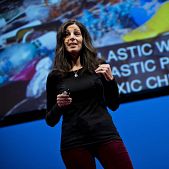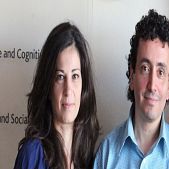
Develops “smart” materials that transform our everyday life
Athanassia Athanassiou is a Senior Researcher, responsible for the Smart Materials Group, in the Nanophysics Department of the Istituto Italiano di Tecnologia in Genoa. In September 2014 she became Tenured Scientist. In her lab, she tries to develop “smart” materials that will have a positive impact on the environment, transportation, packaging or medicine.
“In our research group (Smart Materials Group) my team is working on the development of new materials based on polymer composites and nanocomposites for applications like biomedical devices for controlled drug delivery, flexible electronics, environmental monitoring and cleaning, interactive food packaging, etc. We are focusing more and more on novel biomaterials (of vegetable origin and biodegradable) with enhanced physical properties that can offer us a good life quality and help the environment substituting the non-biodegradable synthetic plastics” says Athanassiou at ellines.com.
What is more interesting, is that a few months ago, Athanassiou along with her team, manufactured a bio-degradable band-aid that can heal a surface wound by releasing some substances that fight off bacteria and other infections.
The decomposing bioplastic material that scientists at the Italian Institute of Technology are developing can be used both as robotic skin and as part of the machine’s internals. Like humans, robots could also start to decompose once their lives end. This is the goal of the new technology being developed in Athanassiou’s Lab.
Athanassiou has graduated in 1996 in Physics at the University of Ioannina in Greece. In 1997 she got the Master of Science (MSc) in Laser Photonics and Modern Optics from the University of Manchester, Laser Photonics Group, Manchester, UK. In 2000 she became Doctor of Philosophy (PhD) at the University of Salford, Laser Photonics and Non-Linear Optics Group, Manchester, UK, in collaboration with the Foundation of Research and Technology-Hellas (FORTH), Institute of Electronic Structure and Laser (IESL), Crete, Greece.
Immediately after the completion of her PhD she got a Postdoctoral Fellowship at the Institute of Electronic Structure and Laser (I.E.S.L.), Foundation for Research and Technology–Hellas (FO.R.T.H.) in Heraklion, Crete, Greece, where she became associated researcher from January 2003 till the end of 2005. From September 2003 to September 2005 she also had an appointment at the Technological University of Crete, School of Applied Technology, Department of Applied Informatics & Multimedia, as Academic Staff/Scientific collaborator.
From January 2006 to December 2011 she was a Senior Researcher at NNL-National Nanotechnology Laboratory, CNR-Istituto di Nanoscienze in Lecce, Italy responsible for the Nanocomposite and Responsive Materials Division. In June 2006 and for two years she got a part time appointment at the Istituto Italiano di Tecnologia in Genova, Italy, as a scientist responsible for the development and initiation of the Optical Spectroscopy-Microscopy and Material Science lab-facility that at the moment is part of the Nanophysics Department. From September 2009 to September 2012 she was also coordinating the Smart Materials Platform at the Center for Biomolecular Nanotechnologies of IIT@UniLe, Lecce.
Scientists from the Italian Institute of Technology led by the Greek scientist are developing ‘smart materials’ that could lead to robots that will decompose like a human body once they’ve reached the end of their life-span. Robots made from biodegradable material would certainly make them more human-like, and perhaps more easily accepted in the real-world. As if the development of biodegradable robots will be a reality in the future, Athanassiou is positive. “In the near future all the products used by humans should become biodegradable, or at least not harmful to the environments, because our planet cannot handle anymore our wastes. High tech solutions should be the first to follow this trend. Robots that will be part of our everyday lives need to follow this trend”.
She has published about 150 articles in refereed journals, she is the author or co-author of several book chapters and she is the inventor of 7 National and 4 International patents.













